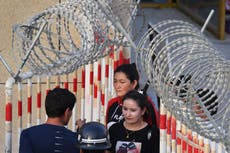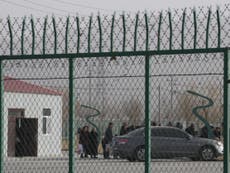With Donald Trump going, who in the free world will stand up for Uighurs now?
The Trump administration pursued an aggressive line on China, which gave Uighurs hope. For the first time our oppressors were being sanctioned and real action was being taken

Your support helps us to tell the story
From reproductive rights to climate change to Big Tech, The Independent is on the ground when the story is developing. Whether it's investigating the financials of Elon Musk's pro-Trump PAC or producing our latest documentary, 'The A Word', which shines a light on the American women fighting for reproductive rights, we know how important it is to parse out the facts from the messaging.
At such a critical moment in US history, we need reporters on the ground. Your donation allows us to keep sending journalists to speak to both sides of the story.
The Independent is trusted by Americans across the entire political spectrum. And unlike many other quality news outlets, we choose not to lock Americans out of our reporting and analysis with paywalls. We believe quality journalism should be available to everyone, paid for by those who can afford it.
Your support makes all the difference.It is now almost four years since I have had any contact with my family in East Turkestan or “Xinjiang”. It is a region in what is now western China that is the historical homeland of the Uighur people and other Turkic Muslims.
The Uighur have faced oppression from the Chinese Communist Party (CCP) for decades. In 1997, Uighur people in my hometown of Ghulja demonstrated against the CCP’s extreme policies aimed at eradicating our culture and religion. The protest was brutally suppressed, and a harbinger of what would follow 20 years later.
As reports of concentration camps and unprecedented surveillance emerged from the Uighur region in 2017, thousands of Uighur in exile received final messages from their family, all communicating the same thing: please do not contact us – when things change, we will reach out to you.
Since then, testimonies have poured in of people who have escaped the region. As a translator, I hear these stories again and again. East Turkestan has become one giant prison. Everyone is watched, all the time. Thousands upon thousands have been sent to the so-called “re-education camps”. In the name of deradicalisation, they are brainwashed, enslaved and humiliated. They are denied their faith and culture, and torn from their families.
This treatment of my people is party policy, even if Beijing still denies allegations of abuse. Leaked high-level Chinese government documents last year quote Xi Jinping himself as saying we should be shown “absolutely no mercy”. China’s state media is even more explicit about what should be done to the Uighur, calling upon the government to “break their lineage, break their roots, break their connections and break their origins”. As The Washington Post put it in an editorial: “It’s hard to read that as anything other than a declaration of genocidal intent.”
It’s a matter of severe trauma for us that the international community is unwilling to act upon this, despite such clear evidence that the CCP wants to destroy our way of life. Besides endless statements, very little has been done to help us. This is also true of the UK. While making efforts, for which we are grateful, to condemn the atrocities of the Chinese government, the UK hasn’t actually done anything to honour its obligations under the UN’s Genocide Convention. No effort has been made to commission a tribunal to probe evidence of atrocities, and the government is expected to oppose a cross-party amendment seeking to enable the UK courts to make a preliminary ruling on genocide.
Looking to the United States, the Uighur diaspora is very worried. Many of us are fearful now that Donald Trump is leaving the White House. To most onlookers this will seem like heresy, but you have to try to put yourself in our shoes. For years nobody stood up for us. The Obama administration: nothing. The David Cameron government: nothing. Angela Merkel: nothing. Theresa May: nothing. Trump? Under Trump, the secretary of state, Mike Pompeo, pursued an aggressive line on China, which gave us hope. For the first time, our oppressors were being sanctioned, and real action was being taken to prevent companies sourcing goods made with Uighur slave labour.
Many believe that this aggressive stance will be replicated in the Biden administration. Certainly anti-CCP sentiment is one of the few remaining areas of consensus in US politics. But Uighur around the world – and Hong Kongers – fear that talk of “engagement” betrays little understanding of the ruthlessness of the man and party currently ruling China. When does “engagement” become “appeasement”? How many more of us need to be detained in camps before free-world governments realise what they’re up against? If the Biden administration fails to pursue the foreign policy of the current administration on China, the rest of the free world will take it as a licence to ease up, thus replicating the mistakes of the past that have left my people languishing in camps, sterilised and denied their culture for so long.
The problem isn’t limited to the United States. The UK may not be a superpower, but it still retains huge influence. The “golden era” of relations with China that George Osborne promoted is still alive and well in the civil service. Parliament, however, has moved on.
This week, Conservative MPs in the China Research Group launched a report titled Defending Democracy in a New World, which makes a number of important recommendations on how Britain and other democracies can deal with the reality of China’s domestic and foreign policy in years to come.
This means the world’s leading democracies acting together. It means the world taking a hard line on the import of goods made with forced labour, tough sanctions against individuals involved in human rights abuses and the financial institutions that provide services to them, greater scrutiny of companies with links to the Chinese Communist Party, and active measures to counter Beijing’s increasingly slick propaganda machine, which attempts to deflect attention from the regime’s oppressive and aggressive policies.
A growing number of parliamentarians across the world are calling for unity across borders and parties over action regarding China. This might be a way of the international community mounting a common defence of persecuted Uighur. God knows, we have waited long enough.
Rahima Mahmut is director of the World Uighur Congress (UK) and adviser to the Inter-Parliamentary Alliance on China.





Join our commenting forum
Join thought-provoking conversations, follow other Independent readers and see their replies
Comments